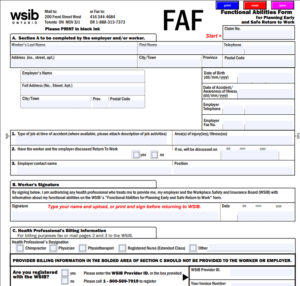The Workplace Safety and Insurance Board (WSIB) is an organization in Ontario, Canada, responsible for administering the province’s workplace safety and insurance system.
It plays a crucial role in protecting workers and employers in the event of workplace injuries, illnesses, or fatalities.
As an employer in Ontario, it’s essential to understand the WSIB’s role and responsibilities to ensure compliance with the law and provide a safe working environment for your employees.
WSIB Coverage in Ontario: Mandatory Insurance
In Ontario, most employers are required by law to have workplace safety insurance coverage through the WSIB.
This coverage provides compensation and support for workers who suffer work-related injuries or illnesses. It helps replace lost wages, covers medical expenses, and provides various rehabilitation and reintegration services. Employers who have business activities covered under Schedule 1, Part I and Schedule 2 of Ontario Regulation 175/98 (the regulation) require coverage.
Ontario employers with business activities listed in Schedule 1, Part II do not require coverage, but have the ability to apply for WSIB coverage for their workers.
WSIB Premiums: Assessing Risks & Compliance
Employers contribute to the WSIB through premiums based on their business activities and payroll.
The WSIB determines the premiums by assessing the risks associated with different industries and employers.
It’s important to accurately report your payroll and job classifications to ensure you pay the appropriate premiums.
Workplace Safety Resources: Creating Safe Environments
The WSIB promotes workplace safety and prevention of injuries and illnesses.
They provide resources, information, and guidelines to help employers create safe working environments.
It’s important to follow safety regulations, conduct regular inspections, and address any hazards or risks to minimize workplace accidents and protect your employees.
WSIB Claims Management: Navigating the Process
When a workplace injury or illness occurs, the WSIB manages the claims process. Employers should report all workplace injuries or illnesses to the WSIB within the specified timeframe. The WSIB assesses the claims, determines the eligibility for compensation, and facilitates the necessary support and services for the injured worker.
Return-to-Work Programs: Support for Recovery
The WSIB encourages employers to implement return-to-work programs.
These programs aim to facilitate the safe and timely return of injured workers to productive employment.
By accommodating work restrictions and providing modified or alternate work, employers can help injured workers maintain their skills, income, and overall well-being.
Compliance & Legal Obligations for Employers
Employers have legal obligations to comply with the Workplace Safety and Insurance Act and its regulations.
This includes maintaining accurate records, submitting payroll information, paying premiums on time, and cooperating with the WSIB during claim investigations.
Failure to meet these obligations may result in penalties or legal consequences.
WSIB Appeals: Fair Dispute Resolution
Employers have the right to appeal decisions made by the WSIB regarding claims, premiums, or other matters.
The WSIB provides a process for dispute resolution, including appeals and hearings, to ensure fair treatment for employers.
WSIB Resources: Safety & Insurance in Ontario
To navigate the WSIB system effectively, employers can access various resources, including the WSIB website, which provides detailed information, forms, guidelines, and tools related to workplace safety, insurance coverage, claims management, and premium calculations.
It’s important to stay informed about your obligations as an employer and maintain a proactive approach to workplace safety to create a secure and healthy environment for employees.
FAQs About WSIB in Ontario
What happens if an employee refuses to report a workplace injury to the WSIB?
If an employee refuses to report a workplace injury, it is important for the employer to document the incident and any relevant information.
The employer should still report the incident to the WSIB, even if the employee does not cooperate.
Failure to report a workplace injury may result in penalties for the employer.
Are self-employed individuals required to have WSIB coverage?
Self-employed individuals are not automatically covered by WSIB in Ontario.
However, they have the option to voluntarily apply for WSIB coverage to protect themselves in case of work-related injuries or illnesses.
Can an employer dispute a decision made by the WSIB regarding a claim?
Yes, employers have the right to dispute a decision made by the WSIB regarding a claim.
They can follow the appeals process outlined by the WSIB, which may involve providing additional evidence or requesting a reconsideration or hearing.
What are the consequences for employers who fail to provide a safe working environment?
Employers who fail to provide a safe working environment may face penalties, fines, or legal consequences.
They can be held liable for injuries or illnesses that occur in their workplace and may be required to compensate affected employees.
Are there any specific requirements for workplace safety training in Ontario?
Yes, Ontario has specific requirements for workplace safety training in certain industries.
Employers should familiarize themselves with the relevant regulations and ensure that employees receive the necessary training to perform their jobs safely.
How long does the WSIB typically take to process a claim?
The processing time for WSIB claims can vary depending on factors such as the complexity of the claim and the availability of supporting documentation.
In general, the WSIB aims to process claims within a reasonable timeframe, which can range from a few weeks to several months.
Can an employer terminate an employee who has filed a workplace injury claim?
Ontario’s employment laws protect employees from being terminated or retaliated against for filing a workplace injury claim.
Terminating an employee solely because they filed a claim can be considered wrongful dismissal and may lead to legal consequences for the employer.
Are temporary workers covered under WSIB?
Yes, temporary workers are typically covered under WSIB.
Employers are responsible for ensuring that all workers, including temporary or contract workers, are covered by WSIB insurance.
How does the WSIB handle pre-existing conditions in relation to workplace injuries?
The WSIB considers pre-existing conditions when assessing a workplace injury claim.
If a work-related incident aggravates or accelerates a pre-existing condition, the WSIB may provide compensation and support based on the impact of the workplace injury on the overall condition.
Are there any exemptions or waivers available for certain industries or types of employers regarding WSIB coverage?
There may be specific exemptions or waivers available for certain industries or types of employers regarding WSIB coverage.
Employers should check the WSIB website or consult with WSIB directly to determine if any exemptions or waivers apply to their specific situation.
Please note that these answers are provided for general information purposes, and it is advisable to consult official WSIB resources or seek professional advice for specific and up-to-date information related to your situation.






